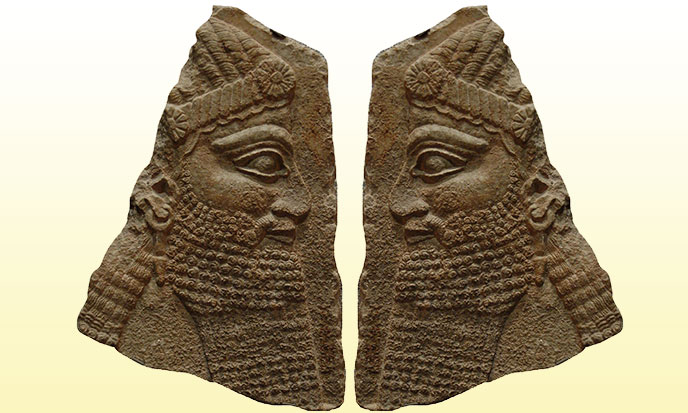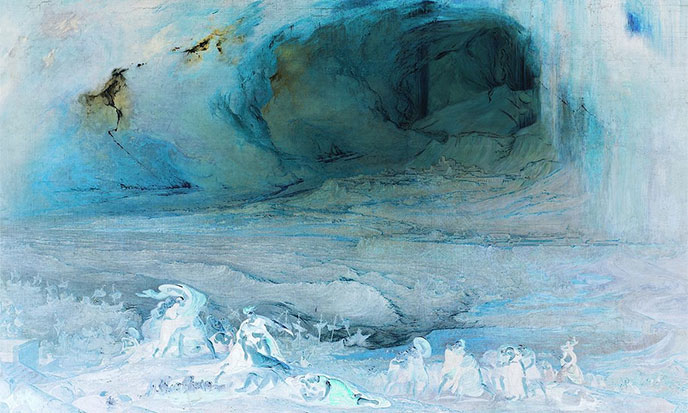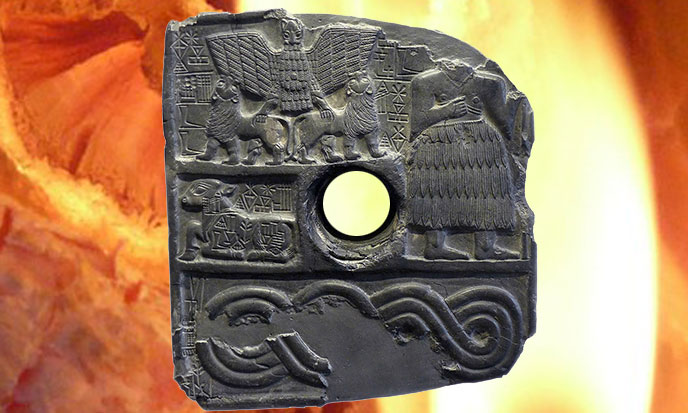
The Sumerian god Enki, or Ea, is the equivalent of the Greek titan Prometheus the geneticist who created men. The prince who has always defended his creatures against the other demigods. The designer who believes in Man case. However, Enki was a reptilian god living in the Underworld called Abzu
Abzu is represented in Sumerian mythology, at the same time as a mythical place, and as a very real residence, that of powerful Enki, our creator. Sometimes located at the top of mountains, sometimes in the bottom of seas, Abzu is also the floating and steering wheel palace of the prince Enki. It could be a spaceship, or other technological device. And Enki? What is therefore this reptilien God who creates our kind in its picture? We have only our primitive cerebrum of reptilien. Memory of a God snake?
AB-ZU, or Apsu in Akkadian, is diverted from the combination of AB or AP «the father, the creator, or the big» and ZU or SU «the one who knows, the sage», the source of any wisdom and any knowledge. Abzu seems to have had three different signification, according to period to which tablets refer. In origin, Abzu indicates Sun. In Sumerian Genesis Abzu is called “the primordial” and “the creator” of planets of our solar system.

Later, when the Anunna settled on our planet, Abzu clearly designates the abode of Enki near the city of Eridu, in the Garden of Eden or Edin, the mountains of the Middle East. Finally, after the Flood, the Abzu becomes “the unfathomable, the deep” where the Greek “abyssos” and English “abyss”. The Abzu then refers to the underworld, where Enki took refuge to shelter from the Great Flood. The underworld has given rise to the myth of the hollow earth.
Anton Parks favors the third meaning: the Abzu means the interior world inside of planets as all planets are hollow. And for Parks, the Abzu is the world below, on which there is Enki. In every case the Abzu is always more or less the housing, or area of Prince Enki. Etymologically, Enki means one who is in the KI. And KI, according to Anton Parks, is the name Anunnaki gave to this planet. (source)Anton Parks, Les chroniques du Girku
That’s why those of Anunna which became established on Earth were called Anunnaki, the Anunna of KI, ie of the Earth. Enki is therefore the prince of the KI, or else the one who is in the depths of KI. This world of depths can also refer to the ancient mines. Before the flood, these mines were systematically exploited to have huge quantities of ore necessary for the development of a civilization. After the flood, contrariwise, the working of mines was left.
The ancient galleries were used as prisons, or even as oubliettes. According to R.A. Boulay « After the Flood, the gold mines of Southern Africa were flooded, the decimated workforce and supervision could make nothing there. In the decades which followed, the Wars of Pyramids finished disrupting Africa. The duke Nergal, master of mines, been relieved of his functions; the prince Enki took over. His first decision was to move all operation in the region of the lake Titicaca and Nazca in Peru. » (source)Flying Serpents and Dragons, R.A. Boulay 1990.

Would Enki be Tiki-Viracocha of the Andes? The likeness of both figures leads Anton Parks to assimilate them. The similarity between both figures is remarkable indeed: they are both civilizing Gods, both they brought development to the half wild men, both they taught them numbers, sciences, trades, fashion and making-up, medicine, kitchen, politeness and softness. Tiki is the first God of Andes, and in Tiki as in Enki there is the Sumerian name of our planet, KI.
R.A. Boulay adds: “This change of continent was also motivated by destruction of space station of Sinaï, during the War of Pyramids. The prince Outou blew up the spatioport to help the princess Inanna against the baron Mardouk and the baroness Sarpanit. Outou was the secret lover and the ally of the royal princess Inanna. As for Mardouk and Sarpanit, they were known in Egypt under the names of Amon-Ra and Nut-Bast and in ancient Greece, they named them Belus and Anchinoe.” (source)Flying Serpents and Dragons, R.A. Boulay, 1990
 So Enki appears as the master of the lower worlds, and also the one who goes under water. In Andes, legend of Tiki-Viracocha said that he was white, bearded, and that he went out of waters of the lake Titicaca. In Mésopotamie, they know Enki under the name of Oannès, and the legend says that he had the body covered with scales, that he went out of the bottom of waters to teach the men, and that every night, he had to regain to the marine depths to sleep. The Hindis think that Brahma, their god of creation, was in origin a fish.
So Enki appears as the master of the lower worlds, and also the one who goes under water. In Andes, legend of Tiki-Viracocha said that he was white, bearded, and that he went out of waters of the lake Titicaca. In Mésopotamie, they know Enki under the name of Oannès, and the legend says that he had the body covered with scales, that he went out of the bottom of waters to teach the men, and that every night, he had to regain to the marine depths to sleep. The Hindis think that Brahma, their god of creation, was in origin a fish.
And the list is far from closed. The people Dogon of Mali maintain the memory of a God fish, Nommo, giving the same characteristics as the God-fish of Mésopotamie, Oannes.
Could we be the descent of the Snake People?


